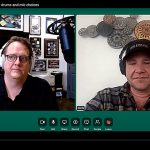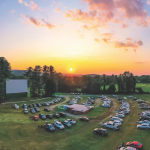What's more rare than a legislative compromise in Washington, DC? Other than unicorns, it might be the audio engineer who occupies both live sound and recording studio roles for the same artist clients.
Two Realms
At first glance, such an arrangement seems logical – as it does for Kirk Kelsey, who has worked in both domains for Creed and, currently, for 3 Doors Down, who sees his unique role as the translator between the two realms, there at the moment of inspiration as the bands have written songs on the road and refined them at sound checks, and there in the studio at the creation of those same songs' recorded versions, recalling the nuances that record producers have found very helpful in translating those ideas to recordings.
Old Nashville hands know that country artists in particular have traditionally drawn very distinct boundaries between the musicians they work with on the road and those they play with in the studio. That delineation can be traced back to the days when entire LPs needed to be done in a matter of days and record labels and producers demanded that artists choose from a small pool of musicians who were guaranteed to nail it perfectly on the first or second take, something that road musicians were at least perceptually unable to provide assurances of. That same effect may have, over time, become one of the broader unwritten rules of the business: Keep the road and the studio separate.
But there are those who routinely cross that border, like Kelsey, who began working with Creed as their FOH mixer on their first tour in 1998, during which the band began writing the songs for their second LP. Kelsey would document the writing and polishing sessions on Pro Tools, and he served as all-around tech for the recording of that next LP, serving in that translator role for producer John Kurzweg, a relationship that evolved to the point that Kelsey was asked to co-produce Creed's third album. He's been building the same kind of relationship with 3 Doors Down, who he met when they toured with Creed, documenting their writing sessions and working with them in the studio as an engineer, musician, programmer and technician.
Dual Identity
"It's just always been my thing – I can see both sides," says Kelsey, who laid the groundwork for this kind of dual identity as a young aspiring producer in South Florida, mixing local bands live and then helping them in the studio. "I can see where the music was coming from [on the road] and see where it was also going to in the studio. It just feels natural."
Chad Franscoviak has done similar dual service for Grammy winner John Mayer almost since the guitarist's first LP. They both met working in Atlanta area studios in 1997, where Franscoviak recorded Mayer as an aspiring artist and a session player. The two became friends and, after Mayer's first LP began to get traction, he asked Franscoviak to mix his live shows in club venues. Since then he's been Mayer's FOH mixer and studio engineer.
"Learning to mix live sound was a trial by fire," Franscoviak recalls, noting how he learned that skill. "Once you get past basic signal flow, [live sound and studio recording] are two pretty different skill sets."
Once Mayer graduated to arenas, it became even more intimidating. But Franscoviak managed to leverage even that situation: "Once we started carrying our own PA, I asked the sound company for some pointers and they were very happy to help," Franscoviak says, since he had significant input into the choice of supplier.
But Franscoviak's experience underscores another reason why perhaps we see so few bi-directional engineers. As he puts it, "it takes a certain kind of artist to be willing to let someone cover both very complex roles."
A Toe in the Water
Working in both realms doesn't necessarily have to be as immersive as it was for Kelsey and Franscoviak, however. Brad Madix, now out with Alice In Chains, was mixing FOH for Bruce Hornsby and the Range in the mid-1990s when he was asked to come in on the recording of the band's Hot House Ball LP in 1995 as a consultant.
"[Bruce] wanted more of a live feel on the record, so I came in essentially in an advisory role, telling them how, for instance, we miked the drums on stage," Madix explains. "It worked out well. It definitely influenced the sound of the record." (Ironic side note: Hornsby's studio engineer, Wayne Pooley, took over mixing Hornsby's FOH from Madix after that.)
But like many other live mixers, Madix wonders why such crossovers don't occur more often. "They're both hard, but in different ways, I suppose," he speculates.
However, technology and a changing business model are eroding that historical boundary between live sound and studio recording. Many major tours now routinely record all of their shows to hard drives, often mixing and editing tracks that will be distributed via the Internet to fans the next day as premium content. Most of the time, it's the FOH mixer who handles those tasks.
Ken "Pooch" Van Druten has done just that for Linkin Park for a decade and says it's a mixed blessing. "I spend my days buried in a dressing room editing and mixing past shows for web release, and I think having intimate knowledge of a band's music leads to better results in the live sound arena and the mixed live releases," he explains. But adds that that can also lead to more than a little overload.
The Money Question
And does more work mean more pay? Van Druten raises those questions himself: "What do we charge our clients as engineers now? We are doing twice the work, [so] do we charge twice as much as our live rate? Do we charge what recording engineers and producers make? Should we be getting back-end [royalties] from these recordings?"
Working on both side of the equation can mean more income – Van Druten negotiated a separate fee per show for mixes he does for web release in addition to his fee as a FOH engineer; Kelsey invoices 3 Doors Down's touring and recording corporations separately at what he says is roughly the same rate, and he still participates in royalty points as co-producer of one of Creed's LPs.
Finally, working both sides also requires some perspective in terms of expectations and watching out for what might be called the "Fifth Beatle" effect.
"I went through that earlier in my career," says Kelsey, of his hopes to become more involved creatively with the artists he works with. "I've come to look at what I do as an opportunity. The credits I get on the records in any capacity are a big help to my career."
To paraphrase the Marines, it's the few, the proud that manage to make live sound and studio work for the same artist clients. It's not, apparently, for everyone.



